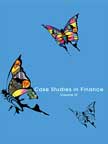Analyzing the Risk Weighted Performance of Equity Mutual Funds
|
ICMR HOME | Case Studies Collection
» Finance Case
Studies 
Custom Search
Please note: |
||||||
Preface
The fund primarily invested in equity and equity related instruments. However, the investments in equities were subjected to certain limitations as prescribed by SEBI2 guidelines (Refer to Exhibit I for SEBI Guidelines). Analyzing the Risk Weighted Performance of Equity Mutual Funds - Next Page>>
1] A closed-ended fund is a publicly traded investment like publicly traded company that raises a fixed amount of capital through an initial public offering (IPO). The fund is then structured, listed, and traded on a stock exchange. Closed-ended funds raise capital only once through an IPO issue by issuing a fixed number of shares to investors. |
Case Studies Links:-
Case Studies,
Short Case Studies,
Simplified Case Studies.
Other Case Studies:-
Multimedia Case Studies,
Cases in Other Languages.
Business Reports Link:-
Business Reports.
Books:-
Textbooks,
Workbooks,
Case Study Volumes.









